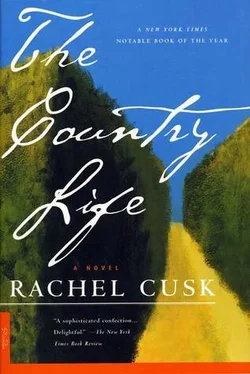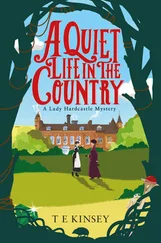Nevertheless I took the path, and found it to lead easily to a small iron gate, on the other side of which lay the pebbled shore of the Maddens’ front drive. I cut stealthily across the gravelled expanse, my frame rigid with casual cunning, and made as if I was intending to stroll past the front door and on down the avenue. Just as I drew level with the door, however, I darted to the right, ascending the steps crabwise with all possible haste. Panting, I poked my finger through the heavy silver slot and peered through it, scanning the long, tenebrous tunnel for signs of life and the minatory glare of Roy. Seeing nothing, I fed the leaflet quickly through the gap and heard it fall with a whisper on the other side. Unfortunately, the lid appeared to be sprung in some manner, and despite the careful easing of my finger free, it slammed down with a loud rap as soon as I had released it. I waited, frozen, for the sound of footsteps; for I had decided in that moment that it was too dangerous to run away, given that I might not have time to find a hiding place. I was glad to feel, even in my terror, that my mental processes seemed to be accelerating somewhat. Many people would have fled panicked from the scene as if under fire, and then been run to ground in the open spaces of the front drive.
Fortunately, nobody appeared to have heard the rap, and after a few minutes of waiting I judged that I was free to go. I set off again across the scorched drive and soon gained the shade of the avenue. Feeling that I could now relax, and knowing that I was in for a long walk, I permitted my mind to wander to other things; and was surprised when I reached the road far sooner than I had anticipated. The empty tarmac shone and glinted before me in the sun. I stood on the brink of it, only then remembering what had happened to my shoes when last I had walked on this road. My only other pair was currently on my feet. I cursed myself, hovering at the silent tarmac as if it were a gushing river. If only I had thought to change my shoes! The prospect of trudging back up the avenue to fetch the ruined pair and then down again was uninviting; indeed, I wouldn’t have time for it. The only alternative was to go back to the cottage and have my walk another day. I had already, after all, achieved my primary aim, which was the delivery of the leaflet. My desire to enquire at the post office was, however, too strong. Before long I had persuaded myself that the vandalism of my only remaining pair of shoes could be overlooked, and indeed might not happen at all, even though past experience insisted to the contrary. The aggravation of my sunburn, which weighted things still more heavily in favour of abandoning the walk, I regarded with similar insouciance. It might happen, I admitted; but then again it might not.
In committing myself wholeheartedly to a course which was neither savoury, profitable, nor necessary — and could turn out to be downright perilous — I was aware that a certain irrationality seemed temporarily to have taken me in its grip. My experience with the gate, however, had given me a sort of curiosity, a thirst for experimentation which I could see no real reason to deny. What I desired to discover was whether the process which, a few minutes earlier, had manufactured the gate according to my need to use it could in fact be mastered and then employed in reverse. I wanted in other words to see how much my intention of avoiding misfortune in the form of tar and sun — a resolution formed, as I have said, in the very midst of a determination to tempt these misfortunes to their limit — would influence the outcome of my walk.
The heat hammered on my shoulders as I walked along the deserted road, and within minutes I had begun to repent my heedlessness. (My little mental game had, I soon saw, merely led me by a circuitous route to the misfortunes reason had long since visited.) I stopped to look at my shoes, and saw to my disappointment several dark and shiny bruises of tar on the soles. I set off again at a faster pace, yearning for the signal houses which would denote the fringe of the village. Just as I was about to break into a run in order to seek shelter, I heard the rapid approach of a car behind me and I bridled my agony, waiting for it to pass. So quickly was the car travelling that I barely had time to stiffen my aching frame into a simulation of leisure and force my unwilling cheeks into a rictus of enjoyment when it shot by. It was a new car, cast in coruscating silver which gave off lecherous winks in the sun, and its beefy rear was raised to me in a rude salute as it passed. A jet of liquid squirted obscenely onto its back windscreen, which its lazy synthetic tail spread foaming over the glass. I was tempted to make some offensive gesture in its wake, but stopped myself with the thought that even if the car didn’t contain one of the Maddens it might be harbouring some acquaintance of theirs who would report the incident back.
The speed with which the brute had passed me, and the knowledge that while I had inched laboriously towards my destination he had doubtlessly attained and surpassed it, redoubled my weariness. My sunburn, however, demanded to be carried with all possible haste to a shady spot, and in the end I was forced to jog feebly along, one hand cupped about my neck and the other reached crosswise over my chest to shield my cheek, until finally I glimpsed the village crouched defensively on the hillside in the glare.
The High Street lay prostrate and almost empty and I flitted unseen from shady doorway to lamp-post towards the post office. There was something disquieting in the silence of the place coupled with the emergency of the heat, as if minutes earlier a siren had sounded ordering evacuation. An old man sat alone at a table outside the pub, one bony knee extended and his hand expansively propped on his walking stick as if he were relating a story to an invisible audience, a cap flat as a coin on his head.
‘Good afternoon,’ I said to him as I passed.
‘Afternoon,’ he said, to my surprise, touching his cap. His riddled, crepuscular eyes looked straight ahead, blind with age, abandoned, like the discarded skins of snakes.
The post office was housed behind a squat terraced front, one of a long row of dwarfish red-brick dwellings, each with a single bay window to the street which bulged out like a pot belly or an insect’s glassy eye. This window was hung with petitions and advertisements, some typed and some merely scrawled on various cards and slips of paper. I scanned them briefly out there on the searing, narrow pavement, and was able to determine that almost without exception the announcements took one of two forms: that of services required, and that of services rendered. It surprised me to be able to place myself so firmly in the second category, having for so long occupied the first; but I adapted to the change quickly enough. Habits are subtle scales, trained to measure whatever one might choose to put on them; and before long I was cheerfully engrossed in what the ladies of Hilltop were offering for a competent girl such as myself, and even wondering whether a covert few hours a week spent in the employ of Mrs Lascelles or Mrs Gower-Ward was entirely out of the question. My eye was soon, however, caught by a more familiar typescript; and looking up I saw that the same leaflet which had been put beneath my door was boldly occupying a central position towards the top of the display. I propelled myself from the window and through the door, which triggered the shrilling of a little bell when I opened it.
I found the post office — or ‘post office’ — to be an even more perplexing place than the ‘shop’ up the road. My first impression was that the pale room whose sepulchral coolness lapped at my burning arms like water contained nothing at all. Its atmosphere was pregnant with lack, and as I stood there I found myself overwhelmed by feelings of need; for food, although there was no reason at all for me to be hungry, having lunched amply with the Maddens; and more pressingly for something to drink. So furious was my thirst that I could look at nothing around me — the empty shelves lining one wall, the yellow Formica countertop leaning against the other, the glass window at the end behind which I could see an old-fashioned till with keys raised high like begging paws — with anything but an eye for its capacity to quench it. Perceiving that I was stranded in a desert of opportunity, my only thought was either to seek out human agency or leave immediately, my greater purpose utterly forgotten. My tongue was as dry as a sock stuffed into my mouth. I scanned the scene once more; and was surprised this time to notice the contours of a human belly tightly encased in a plaid shirt profiled behind the glass screen.
Читать дальше












